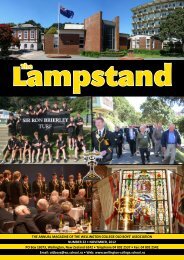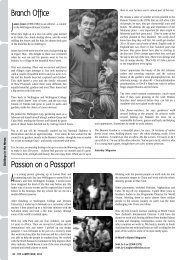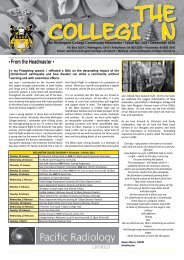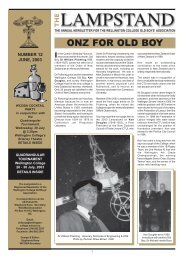Firth House Stories - Wellington College
Firth House Stories - Wellington College
Firth House Stories - Wellington College
You also want an ePaper? Increase the reach of your titles
YUMPU automatically turns print PDFs into web optimized ePapers that Google loves.
A Collection of Memories from former Boarders and <strong>House</strong>masters<br />
connotations. The hall was usually packed<br />
full, probably about a hundred of us. Miss<br />
Laws [?] the dancing teacher would muster<br />
us into two concentric circles, boys on the<br />
inside, girls on the outside. Music would<br />
begin; one circle would rotate clockwise<br />
and the other anticlockwise. When the<br />
music stopped we would turn to face<br />
each other and that would be our chosen<br />
partner for the dance. Like musical chairs<br />
there was usually a bit of a scramble. This<br />
would be repeated many times in the<br />
session. The theory was that we would not<br />
form any durable relationships and we did<br />
not. Perish the thought.<br />
The lessons then continued with the<br />
dancing teacher calling out movements<br />
like a square dance crier. “Slow, slow,<br />
quick, quick, slow” and other less<br />
memorable calls. I do not think that many<br />
of us learned to dance very well but it<br />
probably enabled the dance teacher to<br />
live in a style to which she was accustomed.<br />
For the <strong>Firth</strong> <strong>House</strong> boarders, learning to<br />
dance was never the prime objective. One<br />
of the benefits of this “Rite of Passage”<br />
was that we gained the qualification to<br />
go to school dances at other schools.<br />
We would regularly apply for invitations<br />
to the dances of any schools that were<br />
offering. A number of printed invitations<br />
were always issued to make up a balanced<br />
gender. By showing our invitations to the<br />
duty <strong>House</strong>master we would be granted<br />
extended Friday or Saturday evening<br />
leave. There would be no further checks<br />
on our attendance at the dance. However<br />
we were prepared to offer the excuse of, “I<br />
got lost,” or “I took the wrong bus.”<br />
Although a supper may have been an<br />
enticement, we rarely went to these<br />
dances. Local billiard saloons were a<br />
popular alternative. We became very<br />
good at billiards and snooker. We went<br />
to all the best movies. Our knowledge<br />
of the contemporary music scene was<br />
improved at the local “coffee bars” which<br />
were a sort of innocent equivalent to the<br />
“clubs” of today. Coffee bars visited were<br />
of the likes of “The Tijuana” and “The<br />
Montmartre” and featured bands like “The<br />
Quinn Tikis” and “The Maori Volcanics”.<br />
Our wiser elders considered that just<br />
listening to a twelve bar riff from one of<br />
these bands would addle our brains,<br />
condemn us to Purgatory and corrupt us<br />
for life. In hindsight there may have been<br />
an element of truth in this.<br />
Foundations and Trap Doors<br />
There used to be a bicycle and fire<br />
wood storage room in the basement<br />
under the senior common room at the<br />
east end of <strong>Firth</strong> <strong>House</strong>. An inside wall<br />
had an ugly hole smashed in it giving<br />
access to more of the foundations. When<br />
built, the foundations of <strong>Firth</strong> <strong>House</strong><br />
were a series of walled enclosures with<br />
no interconnecting access. Realising<br />
this, someone had cut a trapdoor in the<br />
prefect’s cell [private study room] above<br />
one of these areas and gained access<br />
to the enclosed compartment below.<br />
Rumour has it that Sam Meads had heard<br />
noise and merriment coming from within<br />
the bowels of the foundations and unable<br />
to discover a means of access attacked<br />
the nearest accessible wall with a sledge<br />
hammer. Not unexpectedly by the time<br />
he had broken through into the cavity, it<br />
was bare. All signs of habitation had been<br />
removed and the trap door had been<br />
fastened closed. I have no doubt that Sam<br />
could have accessed this hideaway in a<br />
much less dramatic manner.<br />
Most likely he had already scouted out<br />
things when boarders were elsewhere<br />
and he was probably was fully aware of<br />
the set up. A very satisfactory solution was<br />
produced by the dramatic entry. To cane<br />
the guilty would have caused resentment<br />
for no more of a misdemeanour than of<br />
being youthful and adventurous. Although<br />
the boarders considered that they had<br />
had a lucky escape and outsmarted Sam,<br />
the cunning effect was that everything<br />
was tidied up and that by leaving the<br />
unrepaired gaping hole this hideaway<br />
was then no longer available.<br />
After Sam Meads had left the <strong>House</strong><br />
and gone to Raumati <strong>College</strong>, another<br />
succession of occupants repeated the<br />
process by cutting another trap door<br />
from an adjoining cell into yet another<br />
cavity in the foundations. The new head<br />
housemaster seemed to be ignorant of<br />
the situation and never discovered this<br />
hideaway. This was exemplified to our joy,<br />
when, on returning from a term holiday<br />
it was noticed that there had been some<br />
maintenance done and the ugly hole had<br />
been bricked up. We now had two hidden<br />
rooms.<br />
A further bonus occurred later when one<br />
of the relevant cells was turned into a “Lost<br />
Property Room”. The duty housemaster<br />
would gather up any clothing or property<br />
that was found untidily lying about and lock<br />
it in this cell. It would only to be returned<br />
on payment of a fine. We considered this<br />
practice was unjust. Sometimes clothing<br />
left in the changing room areas while we<br />
were absent playing sport was “stolen”<br />
by the duty <strong>House</strong>master. In any event,<br />
careful budgeting of our four shillings a<br />
week pocket money made no provisions<br />
for lost property. It was a simple process to<br />
break through the inner wall of our hidden<br />
rooms, come up through the trapdoor<br />
into the lost property room and retrieve<br />
10<br />
the confiscated goods. Amazingly the<br />
property collections continued. We<br />
continued to remove our stuff and replace<br />
it with spent rubbish. The lost property<br />
room became filled with, ragged smelly,<br />
useless junk that no one claimed.<br />
A Gastronomic Delight<br />
An ultimate luxury was to have a supper of<br />
toast made from bread taken from the <strong>Firth</strong><br />
<strong>House</strong> kitchen. The toast was spread with<br />
lashings of butter and anything else we<br />
could purloin. This hot toasted delicacy<br />
was much more enjoyable than the usual<br />
cold toast that was served at breakfast. A<br />
hot Milo drink usually accompanied our<br />
hot toast. Other than this contraband, no<br />
supper was provided in the evening.<br />
As there were very few three pin power<br />
points [for the safety of us all] toasting was<br />
done by plugging into a light socket with<br />
a double light bulb adaptor. This had the<br />
potential to blow the fuse so we would beef<br />
up the circuit by replacing the fuse wire<br />
with some heavy wire. To further add to<br />
the hazard, often the toaster was one of the<br />
cast offs from home and was thus of rather<br />
ancient vintage and in poor condition.<br />
Sometimes we made our own toasters<br />
from a bare toaster element. Electric jugs<br />
were plugged into a light socked in the<br />
same way. Sometimes a boiler was made<br />
from a large jam tin which we had fitted<br />
with a jug element. Thus we learned our<br />
basic science. The wiring did not catch<br />
fire and no one was electrocuted.<br />
Photography Club<br />
What a wonderful club this was. It was<br />
a one room secure haven with running<br />
water, electricity, gas for heating liquids, a<br />
ventilation system and no windows. While<br />
you were in the dark room developing<br />
films in darkness or under an orange light,<br />
no one was allowed to open the outside<br />
door. There could be no unexpected<br />
visits by <strong>House</strong>masters. There was a lot of<br />
photographic developing done, although<br />
there were a lot of failures as very few<br />
photographs were ever produced.<br />
Other scientific processes were also<br />
carried out in this establishment.<br />
Experimental distillation and fermentation<br />
was trialled. It was discovered that a sugar<br />
solution could be fermented with baker’s<br />
yeast. Using equipment borrowed from<br />
the school science laboratories, Bunsen<br />
burners, flasks and cooling columns, we<br />
were able to produce a distilled clear<br />
liquid. One finding was that the distillation<br />
process did not sufficiently purify the<br />
fermented solution as a foul yeast taste<br />
carried over to the distillate. A willing<br />
volunteer was found. After drinking a pint<br />
[600ml] of the clear solution he appeared<br />
to be drunk, staggered about and vomited






